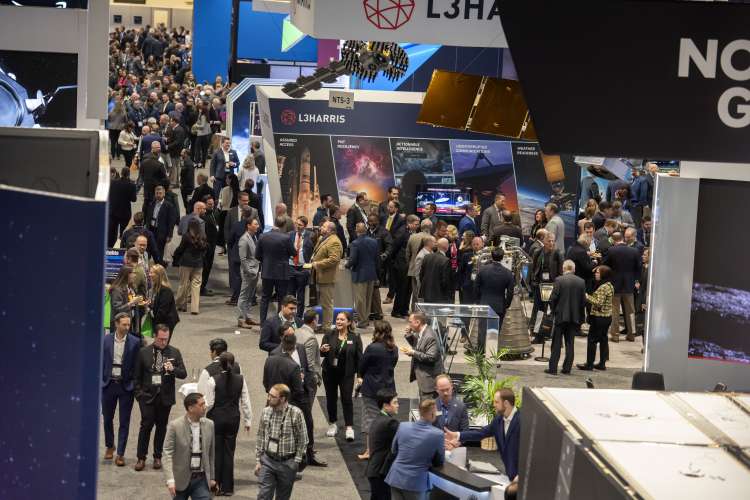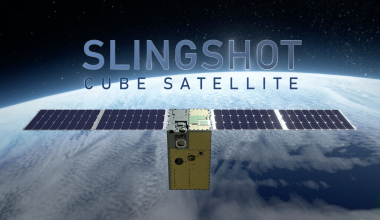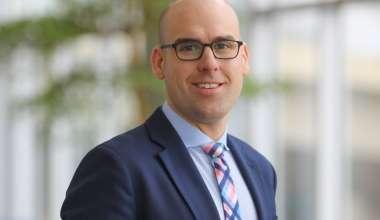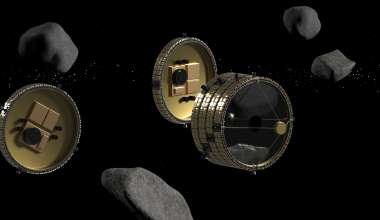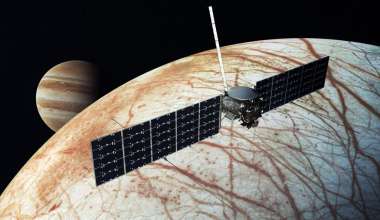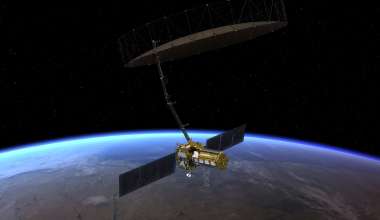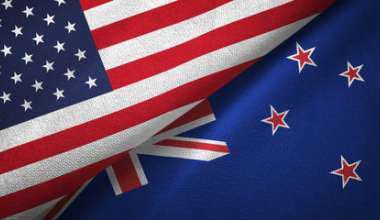Aerospace showcased its valued insight and know-how during Space Symposium 39, advancing important initiatives and discussions while supporting a variety of on-site events and key networking opportunities. The Aerospace team highlighted the ways the corporation is transforming the workforce for the future, increasing its impact within the industry, and providing solutions for its customers. Over 10,000 people from more than 40 countries participated in the annual four-day event, which was held on April 8-11 in Colorado Springs, Colo.
As always, Aerospace was well-represented with leaders and experts shaping and contributing to key initiatives, such as Space Workforce 2030 (SWF2030), deepening ties with government, industry and academia to harness cutting-edge innovations to outpace threats and develop emerging ecosystems such as cislunar and in-space assembly, servicing and manufacturing, and evolving its ability to advance concepts and prototypes ahead of customer need. As a convener and connector across the Space Enterprise, Aerospace leveraged the opportunity to support partnering with commercial industry to rapidly develop and field new space-based capabilities.
"Throughout our nation's history, military success has hinged on support from commercial industry," said Gen. B. Chance Saltzman, Chief of Space Operations of the U.S. Space Force, during his keynote speech. "The Space Force must harness the benefits of technological innovation and emerging capabilities if we're going to be able to out-compete our competitors.”
Space Workforce 2030 Gains Momentum
Established in 2022 as strategic partnership between Space Foundation and Aerospace, SWF2030 brings together a consortium of leading space companies with a shared goal of increasing opportunities for technical talent to engage across the industry. Since its inception, SWF2030 has advanced STEM outreach, recruitment, and best practices, ensuring that the U.S. maintains its competitive edge in space science, exploration and commercialization.
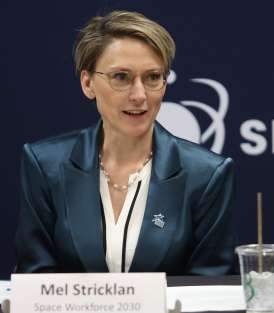
Building upon this success, SWF2030 has appointed Melanie Stricklan as its first Executive Director. During the event Stricklan led a media briefing and released the organization’s second annual report, which highlights the consortium’s notable accomplishments and on-going objectives.
“Our annual report shows that we are making progress across our industry,” said Stricklan. “But it also reminds us that there is more work to be done to grow the pool of talent that is excited, qualified, and cleared to work in space. Maintaining our U.S. leadership position in the competitive arena of space necessitates confronting the critical and growing shortage of technical and other key skills within the space industry.”
The SWF2030 message resonated throughout the week with various speakers and panelists emphasizing the value of this initiative.
Aerospace Principal Director and SWF2030 center of excellence lead Via Van Liew participated in a panel focused on the future of the industry’s workforce, and the importance of shaping an education pipeline and a vibrant culture that empowers all of employees to lead and do their best work.
“Our organization has an employee center of excellence where our 29 partnered companies discuss best practices on how to increase and retain talent within our organizations,” said Van Liew. “We really activate our employee resource groups and business resource groups to engage and create a sense of belonging and psychological safety for employees so that we can retain them, as well as create the culture of our organization that inspire our next generation of people in space.”
On May 3, 2024, SWF2030 hosted its first annual National Space Day, a nationwide broadcast event open to all 4th and 5th grade students in the U.S., designed to inspire interest in STEM studies and a career in the space industry. This initiative will expand in coming years, growing to reach students from kindergarten to college, in addition to ongoing efforts to obtain Congressional recognition of National Space Day.
Fostering the Workforce of the Future
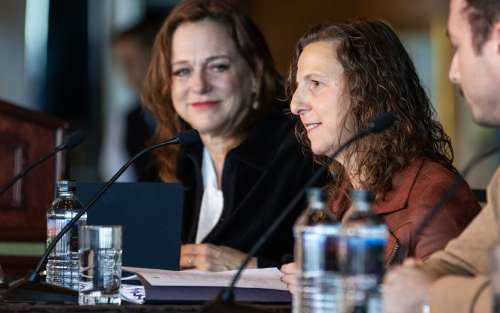
In a demonstration of commitment to fostering a robust and dynamic space workforce to meet the needs of space missions for generations to come, the Aerospace team supported multiple events at the Space Generation Fusion Forum (SGFF), a professional development and networking event focused on the global space industry that is attended by students and young professionals from around the world.
During SGFF, Aerospace’s Executive Director of Corporate Communications Sabrina Steele moderated a panel on the role of media in space industry and policy, and Principal Director of the Space Enterprise and Warfighting Division Joseph Morgan held a presentation on artificial intelligence in space.
This year, Aerospace’s SGFF delegates were Ashley Kowalski and Angelica Ottaviano.
Increasing Growth and Impact
The space industrial sector is evolving dramatically, driving a wave of innovation with the potential to create next-generation space capabilities that meet current and emerging operational needs. While the U.S. government is eager to harness that pace of innovation to improve the nation’s security and prosperity, pressing issues of space governance and regulation remain.
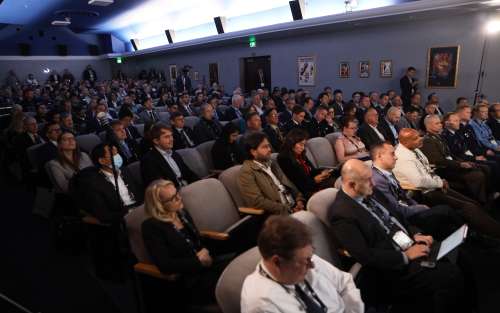
Aerospace participated in two panels featuring government and industry leaders addressing a range of current issues including legal policy challenges to in-space commercial activities, with Aerospace’s VP and Chief Technology Officer Dr. Debra Emmons on hand to discuss IP strategy for emerging space domains, while Audrey Allison, a Senior Policy Analyst with the Center for Space Policy and Strategy, moderated a panel on regulation impacting commercial space activities.
Aerospace also participated in the Symposium’s Space Investment program track covering a host of factors affecting the current and future market for commercial investment in space, such as obstacles to innovation. Aerospace’s Principal Director for Space Enterprise Evolution Ronald Birk emphasized the importance of commercial space access to testbeds and proving grounds as an important solution to the widely held requirement for capabilities to be deemed flight-proven before they are approved to launch to space.
Later within the investment track, Aerospace’s Principal Director for Commercial Space Futures Brian Bone moderated a discussion of ways that the U.S. government and commercial marketplace interact for mutual benefit in the public interest. Bone emphasized Aerospace’s commitment to partnering with customers using a variety of agile business models, including commercial solutions and international partnerships, to create new opportunities and leverage cutting-edge technologies.
Space Safety is Essential
Accelerating commercial space’s pace of innovation and integrating solutions for government requires building consensus on industry best practices and establishing reasonable guidelines for safety and norms of behavior. To illustrate the scale and interconnectedness of space safety issues, Aerospace’s Space Safety Institute convened U.S. government, commercial, and nonprofit space representatives for a tabletop exercise presenting a variety of challenges in communication, coordination, and emergency responses emerging from a simulated low Earth orbit mission in crisis.
Uma Bruegman, Executive Director of the Space Safety Institute, called for greater collaboration on space safety and invited industry input for a forthcoming update to Aerospace’s Space Safety Compendium, including the potential for a safety-dedicated industry consortium.
“There’s going to be such a need for space safety and understanding each other to enable autonomous maneuvering, dodge orbital debris, and avoid collisions in space. And let’s not forget cybersecurity threats,” said Bruegman. “By collaborating for sustainable space futures, we can plug gaps in safety capabilities and coordination, harmonize the language we use to discuss safety norms and policies, and better position the U.S. and our allies to advance the long-term sustainability of space and the potential of the space economy.”
In keeping with this topic, Space Symposium hosted an Aerospace-organized meeting on the topic of international space safety awareness and space traffic management.
Joining Forces Across Industry
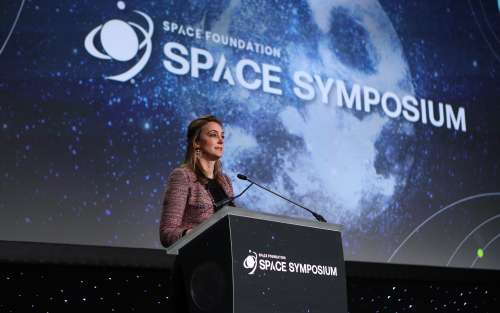
Aerospace has continued to expand its presence at Space Symposium as demonstrated by this year’s well-attended engagements, which also included a TechCrunch innovators reception, and the U.K. Ministry of Defense’s Women in Space Roundtable, for which Emmons joined several representatives from the U.K. and U.S. space agencies and companies to discuss opportunities to strengthen work and partnerships between the two nations.
“Space Symposium was a dynamic experience walking the floors, engaging, and learning what new capabilities are out there,” said Emmons. “It was an amazing opportunity to work with customers, industry partners, with the new space contingent, and with international partners.”
Whether on stage, through press coverage, meeting rooms or simulations, Aerospace’s contribution to Space Symposium 39 demonstrated its thought leadership and vast depth and breadth of expertise, proving its ability to address the challenges of an ever-changing space enterprise, and securing its decades-long position as the nation’s trusted partner for space.
